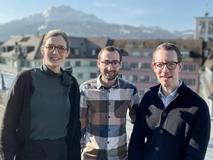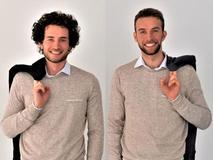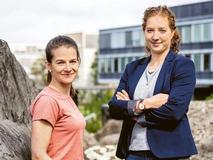Startups developing microalgae photosynthesis to capture CO2, circular economy by centralizing item sharing, tech-facilitated personal development for universities, and enabling the production of whole cut cultivated meat each win CHF 10,000
13.02.2023
Arrhenius, Circular Lugano, Rflect, and sallea win Venture Kick's first stage of financial and entrepreneurial support. Their projects aim to develop and operate large-scale bioreactors in large numbers for the production of microalgae where the carbon will be stored geologically; contribute to reducing CO2 emissions and natural resources waste by providing their customers with any kind of item for rent; enable universities to integrate high-quality, affordable, and scalable personal development into existing curricula; and allow the manufacturing of novel cell-growth scaffolds resulting in whole-cut cultivated meat indistinguishable from a real steak.
 |
 Arrhenius: on the left, CFO, CBDO and CMO Karina von dem Berge, in the middle CEO and CTO Reto Tamburini, and on the right CSO Dr. Mirko Kleingries.
|
 Circular Economy Founders Mirco and Luca De Savelli
|
 Rflect CEO Niels Rot and CTO Ivan Jovanovic
|
 sallea:CTO Dr. Nicole Kleger, on the left and CEO Simona Fehlmann, on the right
Photocredits © ETH Foundation / Daniel Winkler
|
Arrhenius: microalgae photosynthesis to capture CO2
In order to counteract climate change, not only must new CO2 emissions be prevented, but historical emissions also have to be removed from the atmosphere permanently on a large scale. A promising approach for atmospheric CO2 removal is the production and long-term storage of biomass. The most efficient way to produce biomass is the production of rapidly dividing microalgae in warm water.
Arrhenius aims to develop and operate large-scale bioreactors in large numbers for the production of microalgae where the carbon will be stored geologically. The team is composed of CEO and CTO Reto Tamburini, MScE and actually, a Research Associate at HSLU in the field of NET, microalgae cultivation specialist; CFO, CBDO, CMO Karina von dem Berge, MScBA; CSO Dr. Mirko Kleingries, Ph.D.; and serial entrepreneur Wilm Kleingries, GradEng, in the supervisory board. Arrhenius aims to offer Carbon Dioxide Removal as a Service (CDRaaS) to companies and private individuals as well as to give climate cooperatives the opportunity to clean the atmosphere through citizen participation by providing facilities. Arrhenius develops and operates photobioreactors in which microalgae proliferate with unparalleled productivity by supplying water, atmospheric CO2, and nutrients. The carbon of the continuously produced biomass is stored geologically. This two-step process corresponds to a sustainable biotechnological Direct Air Capture and Storage process that offers Carbon offset and Carbon Dioxide Removal as a Service to companies, institutions, and private consumers. The Taskforce on Scaling Voluntary Carbon Markets (TSVCM) expects that the market for carbon credits may amount to as much as 2 gigatons of CO2 by 2030. Depending on the CO2 price, this corresponds to a financial market volume in 2030 of up to USD 50 billion per year. For 2050, the volume is expected to be as high as 13 gigatons of CO2 per year, or the equivalent of USD 325 billion. The Arrhenius USP is their efficient and robust low-tech solution where, as opposed to the competitors, the largest part of the CO2 molecule is already released directly during carbon sequestration as O2 and the carbon is already present in the product as a solid.
The Venture Kick funding will enable the realization of the two prototypes HEP and HPP (MS 1 and 2), which should be completed by fall 2023.
Circular Lugano: circular economy by centralizing item sharing
For end users, there is no possibility to rent most domestic items. The ones available for rent are all in different locations, and it's not possible to enjoy most items without causing pollution and waste. Too many rarely-used items are stocked in the cellar. For companies, there is a need to compensate for their ecological footprint.
Circular Lugano is a subscription-based social startup aiming at fostering the transition towards the circular economy by centralizing item sharing. The team is composed of co-founders Mirco De Savelli, who recently graduated MA in Management and Economics from the University of Zurich, and Head of legal Luca De Savelli. The content and marketing manager is Nikola Kovacevic. Together they contribute to reducing CO2 emissions and natural resources waste by providing their customers with any kind of item for rent so that one item can be used by multiple people and its utilization can be maximized. Their pilot project in Lugano is up and running and they are partnering up with local companies to speed up the transition. They launched the online platform on October 2020 and opened the first physical store in May 2022. Since its opening in May, they had more than 170 paying customers and contributed to saving more than 45'000 kg of CO2 emissions.
The Venture Kick funds will help them improve the quality of the items they offer and get ready to scale the business. circular-lugano.ch
Rflect: tech-facilitated personal development for universities
In 2023, it is not enough anymore for students to excel in subject matter only. Society and industry are putting pressure on universities to equip future generations with excellent personal development and future skills such as collaboration and self-leadership. Yet, universities do not offer this at scale as existing solutions are expensive, and not scalable, and most universities lack in-house knowledge.
Rflect enables universities to integrate high-quality, affordable, and scalable personal development into existing curricula. Their tech-based personal development program is integrated horizontally into existing programs as a mandatory module. Students receive reflection questions tailored to their study program, join peer coaching and use personalized challenges to turn insight into action. Their core value propositions to the users are first on price & efficiency: Rflect is cheaper than current courses through their scalable technology; and then on Know-how: their proven methodology removes the need for universities to build in-house competence centers on personal development. The WEF predicts the world’s largest internet company by 2030 to be in online learning. The global education market is already a USD 6 Trillion market and is set to reach USD 10 Trillion by 2030. Switzerland alone had more than 300’000 students in 2019, in an estimated 15’000 different study programs. Given the international nature of the education market, Rflect's team expects to be able to scale quickly to DACH, Europe, and beyond. Europe alone has 13’724 accredited universities, globally there are said to be 90’000 public ones, meaning a TAM of approx. CHF 6 billion with their current pricing hypothesis. Rflect launched its MVP in the spring semester 2023 with 7 customers from ETH, HSG, BFH, and others.
They will use the Venture Kick funding mainly to speed-up product development. The Venture Kick kickers camp will help further refine the storytelling and ideally improve the financial model. rflect.ch
sallea: enabling the production of whole-cut cultivated meat
Producing enough food for a growing world population while reducing environmental damage is a huge challenge. The cultivation of meat has great potential to reduce the use of energy, water, and land. Currently, only the production of thin layers of cultivated meat is possible, which limits the offering to minced or processed meat. To cultivate whole-cut meat, the development of novel cell-growth scaffolds is essential.
Sallea's technology enables the manufacturing of such scaffolds addressing the limitations of current systems by providing open, hierarchical porosity and free choice of material for greatly enhanced nutrient transport during the cultivation of meat. Sallea co-founders CEO Simona Fehlmann, MSc ETH materials science, and CTO Dr. Nicole Kleger, Ph.D. ETH materials science, aim at providing these novel scaffolds to foodtech companies. sallea’s flexible scaffold manufacturing technology holds the potential to enable the cultivation of whole-cut meat indistinguishable from a real steak. The scaffolds are available from a broad range of materials, including biopolymers, with high control of the pore shape and size, and overall porosity. The resulting design freedom shall result in highly efficient scaffolds for companies producing cultivated protein like meat and fish. The overall market size of cellular agriculture is rapidly expanding and reached USD 133.4 billion in 2021. Lab-cultured meat claimed USD 1.64 M thereof with an estimated compound annual growth rate of 95.8% per year (2022–2030) to reach USD 2.8 billion per year by 2030 (Allied Market Research). Therefore, sallea sees great potential for their technology to further support the highly innovative and fast-moving cellular agriculture field.
The funds of Venture Kick will be used to get preliminary cell test results needed for further non-dilutive funding. Further, the fund will be used for material costs and customer acquisition such as participating in fairs.
In order to counteract climate change, not only must new CO2 emissions be prevented, but historical emissions also have to be removed from the atmosphere permanently on a large scale. A promising approach for atmospheric CO2 removal is the production and long-term storage of biomass. The most efficient way to produce biomass is the production of rapidly dividing microalgae in warm water.
Arrhenius aims to develop and operate large-scale bioreactors in large numbers for the production of microalgae where the carbon will be stored geologically. The team is composed of CEO and CTO Reto Tamburini, MScE and actually, a Research Associate at HSLU in the field of NET, microalgae cultivation specialist; CFO, CBDO, CMO Karina von dem Berge, MScBA; CSO Dr. Mirko Kleingries, Ph.D.; and serial entrepreneur Wilm Kleingries, GradEng, in the supervisory board. Arrhenius aims to offer Carbon Dioxide Removal as a Service (CDRaaS) to companies and private individuals as well as to give climate cooperatives the opportunity to clean the atmosphere through citizen participation by providing facilities. Arrhenius develops and operates photobioreactors in which microalgae proliferate with unparalleled productivity by supplying water, atmospheric CO2, and nutrients. The carbon of the continuously produced biomass is stored geologically. This two-step process corresponds to a sustainable biotechnological Direct Air Capture and Storage process that offers Carbon offset and Carbon Dioxide Removal as a Service to companies, institutions, and private consumers. The Taskforce on Scaling Voluntary Carbon Markets (TSVCM) expects that the market for carbon credits may amount to as much as 2 gigatons of CO2 by 2030. Depending on the CO2 price, this corresponds to a financial market volume in 2030 of up to USD 50 billion per year. For 2050, the volume is expected to be as high as 13 gigatons of CO2 per year, or the equivalent of USD 325 billion. The Arrhenius USP is their efficient and robust low-tech solution where, as opposed to the competitors, the largest part of the CO2 molecule is already released directly during carbon sequestration as O2 and the carbon is already present in the product as a solid.
The Venture Kick funding will enable the realization of the two prototypes HEP and HPP (MS 1 and 2), which should be completed by fall 2023.
Circular Lugano: circular economy by centralizing item sharing
For end users, there is no possibility to rent most domestic items. The ones available for rent are all in different locations, and it's not possible to enjoy most items without causing pollution and waste. Too many rarely-used items are stocked in the cellar. For companies, there is a need to compensate for their ecological footprint.
Circular Lugano is a subscription-based social startup aiming at fostering the transition towards the circular economy by centralizing item sharing. The team is composed of co-founders Mirco De Savelli, who recently graduated MA in Management and Economics from the University of Zurich, and Head of legal Luca De Savelli. The content and marketing manager is Nikola Kovacevic. Together they contribute to reducing CO2 emissions and natural resources waste by providing their customers with any kind of item for rent so that one item can be used by multiple people and its utilization can be maximized. Their pilot project in Lugano is up and running and they are partnering up with local companies to speed up the transition. They launched the online platform on October 2020 and opened the first physical store in May 2022. Since its opening in May, they had more than 170 paying customers and contributed to saving more than 45'000 kg of CO2 emissions.
The Venture Kick funds will help them improve the quality of the items they offer and get ready to scale the business. circular-lugano.ch
Rflect: tech-facilitated personal development for universities
In 2023, it is not enough anymore for students to excel in subject matter only. Society and industry are putting pressure on universities to equip future generations with excellent personal development and future skills such as collaboration and self-leadership. Yet, universities do not offer this at scale as existing solutions are expensive, and not scalable, and most universities lack in-house knowledge.
Rflect enables universities to integrate high-quality, affordable, and scalable personal development into existing curricula. Their tech-based personal development program is integrated horizontally into existing programs as a mandatory module. Students receive reflection questions tailored to their study program, join peer coaching and use personalized challenges to turn insight into action. Their core value propositions to the users are first on price & efficiency: Rflect is cheaper than current courses through their scalable technology; and then on Know-how: their proven methodology removes the need for universities to build in-house competence centers on personal development. The WEF predicts the world’s largest internet company by 2030 to be in online learning. The global education market is already a USD 6 Trillion market and is set to reach USD 10 Trillion by 2030. Switzerland alone had more than 300’000 students in 2019, in an estimated 15’000 different study programs. Given the international nature of the education market, Rflect's team expects to be able to scale quickly to DACH, Europe, and beyond. Europe alone has 13’724 accredited universities, globally there are said to be 90’000 public ones, meaning a TAM of approx. CHF 6 billion with their current pricing hypothesis. Rflect launched its MVP in the spring semester 2023 with 7 customers from ETH, HSG, BFH, and others.
They will use the Venture Kick funding mainly to speed-up product development. The Venture Kick kickers camp will help further refine the storytelling and ideally improve the financial model. rflect.ch
sallea: enabling the production of whole-cut cultivated meat
Producing enough food for a growing world population while reducing environmental damage is a huge challenge. The cultivation of meat has great potential to reduce the use of energy, water, and land. Currently, only the production of thin layers of cultivated meat is possible, which limits the offering to minced or processed meat. To cultivate whole-cut meat, the development of novel cell-growth scaffolds is essential.
Sallea's technology enables the manufacturing of such scaffolds addressing the limitations of current systems by providing open, hierarchical porosity and free choice of material for greatly enhanced nutrient transport during the cultivation of meat. Sallea co-founders CEO Simona Fehlmann, MSc ETH materials science, and CTO Dr. Nicole Kleger, Ph.D. ETH materials science, aim at providing these novel scaffolds to foodtech companies. sallea’s flexible scaffold manufacturing technology holds the potential to enable the cultivation of whole-cut meat indistinguishable from a real steak. The scaffolds are available from a broad range of materials, including biopolymers, with high control of the pore shape and size, and overall porosity. The resulting design freedom shall result in highly efficient scaffolds for companies producing cultivated protein like meat and fish. The overall market size of cellular agriculture is rapidly expanding and reached USD 133.4 billion in 2021. Lab-cultured meat claimed USD 1.64 M thereof with an estimated compound annual growth rate of 95.8% per year (2022–2030) to reach USD 2.8 billion per year by 2030 (Allied Market Research). Therefore, sallea sees great potential for their technology to further support the highly innovative and fast-moving cellular agriculture field.
The funds of Venture Kick will be used to get preliminary cell test results needed for further non-dilutive funding. Further, the fund will be used for material costs and customer acquisition such as participating in fairs.


